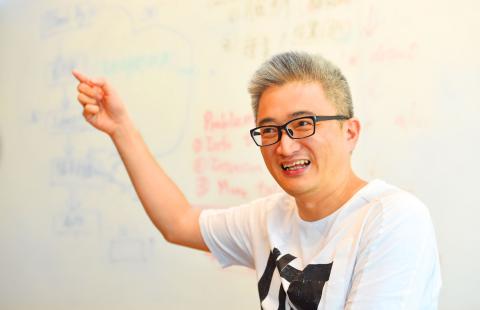Ethan Tu (杜奕瑾), creator of the Professional Technology Temple (PTT) online bulletin board, on Monday warned the public against using Chinese apps and hardware, which he said could be used to collect users’ personal information without their consent.
Citing an article published on Friday by the Electronic Frontier Foundation about a series of data leaks at several Chinese firms, Tu wrote on Facebook that the people who built the compromised databases either lacked knowledge of cybersecurity or did not value it.
Chinese artificial intelligence company SenseNets Technology Ltd (中國深網視科技), which develops video-based crowd analysis and facial recognition technology, was last month found to have left its facial recognition database exposed for at least six months.

Photo: Liu Hsin-de, Taipei Times
Two more databases were since found to have been breached, affecting 364 million users, Tu said.
The leaked information includes identification numbers, nationalities, telephone numbers, dates of birth, home addresses, facial recognition and location data, and chat and traffic violation records, he said, adding that people can freely download and modify the information.
“Were they exposed so that China’s national security departments can thoroughly study them?” Tu asked.
While it is difficult to make a database that incorporates private and public systems 100 percent safe, the exposed databases had zero protection and no password protection, he said.
It proves that the Chinese government has been collecting real-time information via apps such as WeChat (微信), QQ and Aliwangwang (阿里旺旺), as well as Apple Inc’s messaging platform, he said.
The information can be automatically collected by China’s state surveillance system without users’ consent, he added.
“The best way to protect yourself is to choose online platforms and hardware from trustworthy providers and partners,” Tu said.
For example, when using an Apple smartphone for the first time, avoid setting your location as China to prevent personal information from being shared with the Chinese surveillance system, he said.
People should also avoid using any apps, Internet services or hardware from Chinese providers, Tu said.
While any company could gather its customers’ personal information, in the West, companies that are found to have done so in unethical ways would be punished by the market, but Chinese companies do not face such consequences, he said.

STILL COMMITTED: The US opposes any forced change to the ‘status quo’ in the Strait, but also does not seek conflict, US Secretary of State Marco Rubio said US President Donald Trump’s administration released US$5.3 billion in previously frozen foreign aid, including US$870 million in security exemptions for programs in Taiwan, a list of exemptions reviewed by Reuters showed. Trump ordered a 90-day pause on foreign aid shortly after taking office on Jan. 20, halting funding for everything from programs that fight starvation and deadly diseases to providing shelters for millions of displaced people across the globe. US Secretary of State Marco Rubio, who has said that all foreign assistance must align with Trump’s “America First” priorities, issued waivers late last month on military aid to Israel and Egypt, the

‘UNITED FRONT’ FRONTS: Barring contact with Huaqiao and Jinan universities is needed to stop China targeting Taiwanese students, the education minister said Taiwan has blacklisted two Chinese universities from conducting academic exchange programs in the nation after reports that the institutes are arms of Beijing’s United Front Work Department, Minister of Education Cheng Ying-yao (鄭英耀) said in an exclusive interview with the Chinese-language Liberty Times (the Taipei Times’ sister paper) published yesterday. China’s Huaqiao University in Xiamen and Quanzhou, as well as Jinan University in Guangzhou, which have 600 and 1,500 Taiwanese on their rolls respectively, are under direct control of the Chinese government’s political warfare branch, Cheng said, citing reports by national security officials. A comprehensive ban on Taiwanese institutions collaborating or

France’s nuclear-powered aircraft carrier and accompanying warships were in the Philippines yesterday after holding combat drills with Philippine forces in the disputed South China Sea in a show of firepower that would likely antagonize China. The Charles de Gaulle on Friday docked at Subic Bay, a former US naval base northwest of Manila, for a break after more than two months of deployment in the Indo-Pacific region. The French carrier engaged with security allies for contingency readiness and to promote regional security, including with Philippine forces, navy ships and fighter jets. They held anti-submarine warfare drills and aerial combat training on Friday in

COMBAT READINESS: The military is reviewing weaponry, personnel resources, and mobilization and recovery forces to adjust defense strategies, the defense minister said The military has released a photograph of Minister of National Defense Wellington Koo (顧立雄) appearing to sit beside a US general during the annual Han Kuang military exercises on Friday last week in a historic first. In the photo, Koo, who was presiding over the drills with high-level officers, appears to be sitting next to US Marine Corps Major General Jay Bargeron, the director of strategic planning and policy of the US Indo-Pacific Command, although only Bargeron’s name tag is visible in the seat as “J5 Maj General.” It is the first time the military has released a photo of an active